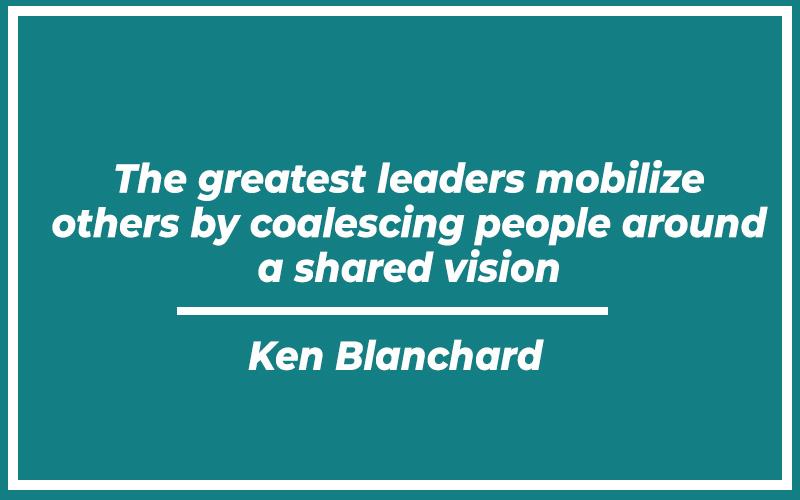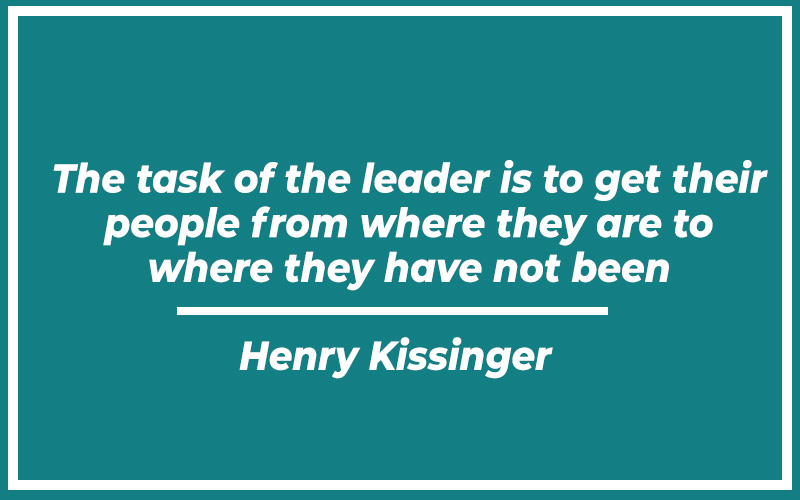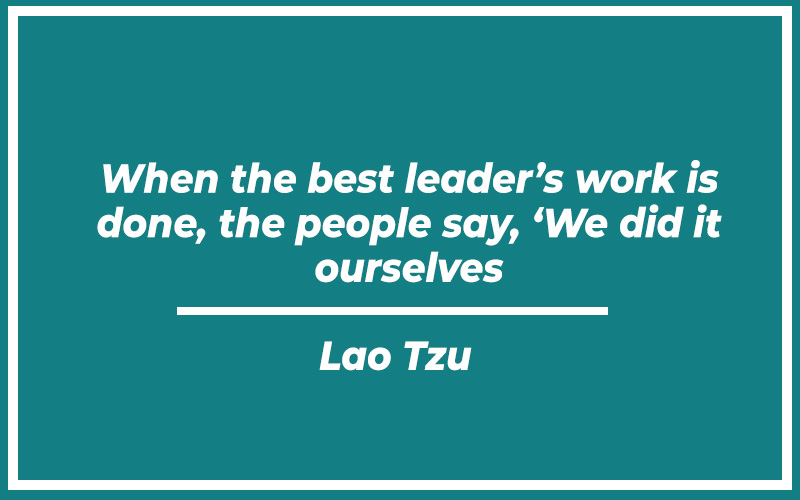Ineffective leadership impacts everything from company morale to the well-being of entire nations. There are countless examples of leaders prioritizing personal gain over the needs of the people they represent.
Corruption thrives in such environments and this leaves citizens feeling unheard and unsupported. The following quotes speak on the dangers of bad leadership and the importance of ethical leaders who prioritize the greater good.
Bad Leadership Quotes

“The greatest leaders mobilize others by coalescing people around a shared vision.” – Ken Blanchard
Ken Blanchard’s quote emphasizes the power of a shared vision in leadership. This perspective highlights that bad leaders may lack a clear vision or fail to communicate it effectively, resulting in disengagement and confusion.
It encourages viewers to develop and articulate a compelling vision that unites and motivates their team. Blanchard’s words remind us that effective leadership involves inspiring collective effort towards a common goal, fostering a sense of purpose and cohesion within the team.
“Leadership is the capacity to translate vision into reality.” – Warren Bennis
This Warren Bennis quote underscores the importance of turning ideas into action. This perspective highlights that bad leaders often struggle to move beyond planning and envisioning, failing to implement their strategies effectively.
It encourages viewers to recognize that true leadership is demonstrated through the ability to realize ambitions and bring plans to fruition. Bennis’s words remind us that effective leadership involves practical execution and the ability to transform vision into tangible outcomes, ensuring that goals are achieved.
“To handle yourself, use your head; to handle others, use your heart.” – Eleanor Roosevelt
Eleanor Roosevelt’s quote distinguishes between self-management and leadership. This perspective emphasizes that bad leaders may focus solely on intellect and logic, neglecting empathy and emotional intelligence. It encourages viewers to understand that leading others requires compassion and understanding.
Roosevelt’s words remind us that effective leadership involves balancing rational decision-making with emotional sensitivity, creating an environment where team members feel valued and understood, leading to stronger, more cohesive teams.
“The very essence of leadership is that you have to have a vision. It’s got to be a vision you articulate clearly and forcefully on every occasion. You can’t blow an uncertain trumpet.” – Reverend Theodore M. Hesburgh
Reverend Theodore M. Hesburgh’s quote highlights the critical role of clear and consistent vision in leadership. This perspective contrasts with bad leadership, which often involves ambiguous or poorly communicated goals. It encourages viewers to articulate their vision with clarity and conviction.
Hesburgh’s words remind us that effective leaders must consistently and clearly communicate their vision to inspire and guide their teams, ensuring that everyone is aligned and motivated towards common objectives.
“Effective leadership is not about making speeches or being liked; leadership is defined by results, not attributes.” – Peter Drucker
Peter Drucker’s quote focuses on the outcomes of leadership rather than the style or personal qualities. This perspective highlights that bad leaders may prioritize popularity or eloquence over actual performance. It encourages viewers to measure their leadership effectiveness by the tangible results they achieve.
Drucker’s words remind us that true leadership is evaluated through the success and impact of the team’s efforts, emphasizing the importance of delivering results and achieving goals over superficial qualities.
“A good leader takes a little more than his share of the blame, a little less than his share of the credit.” – Arnold H. Glasow
Arnold H. Glasow’s quote emphasizes the humility and accountability required in effective leadership. This perspective contrasts with bad leadership, which often involves deflecting blame and seeking credit.
Glasow’s words remind us that effective leadership involves being accountable and generous, fostering an environment of trust and respect where team members feel supported and valued.
“Leadership is not about being in charge. It is about taking care of those in your charge.” – Simon Sinek
Simon Sinek’s quote redefines leadership as a role of care rather than control. This perspective highlights that bad leaders focus on authority and command, while good leaders prioritize the well-being and development of their team. It encourages viewers to adopt a nurturing and supportive leadership style.
Sinek’s words remind us that true leadership is about fostering a positive environment where team members feel valued, supported, and empowered to succeed and grow.
“The art of leadership is saying no, not saying yes. It is very easy to say yes.” – Tony Blair
Tony Blair’s quote emphasizes the importance of discernment in leadership. This perspective highlights that bad leaders may seek to please everyone by agreeing to everything, leading to overcommitment and inefficiency. It encourages viewers to recognize the value of setting boundaries and making tough decisions.
Blair’s words remind us that effective leadership involves making thoughtful, strategic choices and understanding that saying no can be essential for maintaining focus and achieving long-term goals.
“The function of leadership is to produce more leaders, not more followers.” – Ralph Nader
Ralph Nader’s quote highlights the transformative role of a true leader. This perspective contrasts with bad leadership, which focuses on creating followers who simply execute orders. It encourages viewers to cultivate leadership qualities in others, promoting independence and growth.
Nader’s words remind us that the hallmark of effective leadership is the ability to inspire and develop future leaders, ensuring the sustainability and evolution of an organization or community.
“True leadership stems from individuality that is honestly and sometimes imperfectly expressed… Leaders should strive for authenticity over perfection.” – Sheryl Sandberg
Sheryl Sandberg’s quote emphasizes the importance of authenticity in leadership. This perspective highlights that bad leaders may prioritize a façade of perfection, which can be alienating and unsustainable. It encourages viewers to embrace their true selves, including their imperfections.
Sandberg’s words remind us that genuine connections and trust are built through honesty and vulnerability, and that leaders who are authentic inspire and connect more deeply with their teams.
“A great leader takes people where they don’t necessarily want to go, but ought to be.” – Rosalynn Carter
Rosalynn Carter’s quote underscores the visionary aspect of effective leadership. This perspective contrasts with bad leadership, which may avoid challenging the status quo or making unpopular decisions.
It encourages viewers to recognize that true leaders guide their teams towards necessary, albeit sometimes difficult, paths. Carter’s words remind us that effective leadership involves foresight and the courage to make tough decisions for the greater good, ultimately leading to growth and improvement.
“The challenge of leadership is to be strong, but not rude; be kind, but not weak; be bold, but not a bully; be humble, but not timid; be proud, but not arrogant; have humor, but without folly.” – Jim Rohn
Jim Rohn’s quote highlights the delicate balance required in effective leadership. This perspective contrasts with the extremes often seen in bad leadership, such as rudeness, weakness, or arrogance.
It encourages viewers to strive for a balanced approach that incorporates strength, kindness, boldness, humility, pride, and humor. Rohn’s words remind us that great leadership involves navigating these nuances skillfully, creating an environment of respect, inspiration, and effective collaboration.
“The greatest leaders mobilize others by coalescing people around a shared vision.” – Ken Blanchard
Ken Blanchard’s quote emphasizes the power of a shared vision in leadership. This perspective highlights that bad leaders may lack a clear vision or fail to communicate it effectively, resulting in disengagement and confusion.
It encourages viewers to develop and articulate a compelling vision that unites and motivates their team. Blanchard’s words remind us that effective leadership involves inspiring collective effort towards a common goal, fostering a sense of purpose and cohesion within the team.
Also Read: 13 Going on 30 Quotes (with Explanation)
“A leader is best when people barely know he exists, when his work is done, his aim fulfilled, they will say: we did it ourselves.” – Lao Tzu
Lao Tzu’s quote highlights the subtlety and humility of effective leadership. This perspective contrasts sharply with bad leadership, which often seeks recognition and control. It encourages viewers to understand that the best leaders empower their teams to take ownership and pride in their accomplishments.
Lao Tzu’s words remind us that true leadership is about facilitating success and fostering independence, creating an environment where the team can thrive and feel confident in their achievements.

“The task of the leader is to get their people from where they are to where they have not been.” – Henry Kissinger
This Henry Kissinger quote emphasizes the transformative role of leadership. This perspective highlights that bad leaders may fail to inspire or guide their teams towards new goals and opportunities. It encourages viewers to understand that effective leadership involves envisioning and directing the path to growth and innovation.
Kissinger’s words remind us that leaders are responsible for charting new territories and helping their teams navigate through uncharted waters to achieve progress and success.
“Leadership is practiced not so much in words as in attitude and in actions.” – Harold S. Geneen
Harold S. Geneen’s quote underscores the importance of actions and attitudes over rhetoric in leadership. This perspective highlights that bad leaders may rely heavily on words without backing them up with consistent, positive actions.
It encourages viewers to lead by example, demonstrating integrity and commitment through their behavior. Geneen’s words remind us that effective leadership is embodied in daily actions and attitudes that inspire trust and respect from the team.
“A leader takes people where they want to go. A great leader takes people where they don’t necessarily want to go but ought to be.” – Rosalynn Carter
Rosalynn Carter’s quote highlights the distinction between mere leadership and great leadership. This perspective emphasizes that bad leaders may only cater to immediate desires without considering long-term benefits.
Carter’s words remind us that true leaders have the vision and courage to make tough decisions for the greater good, leading to growth and improvement.
“The most dangerous leadership myth is that leaders are born – that there is a genetic factor to leadership. This myth asserts that people simply either have certain charismatic qualities or not. That’s nonsense; in fact, the opposite is true. Leaders are made rather than born.” – Warren Bennis
Warren Bennis’s quote debunks the myth of innate leadership qualities. This perspective highlights that bad leadership can stem from the belief that effective leaders don’t need to develop their skills. It encourages viewers to understand that leadership abilities are cultivated through experience, learning, and effort.
Bennis’s words remind us that anyone can become a good leader with dedication and practice, emphasizing the importance of continuous growth and self-improvement.
“The price of greatness is responsibility.” – Winston Churchill
Winston Churchill’s quote underscores the crucial role of responsibility in leadership. This perspective highlights that bad leaders often shirk responsibility, leading to a lack of accountability and trust. It encourages viewers to understand that true greatness in leadership comes with a commitment to take responsibility for one’s actions and decisions.
Churchill’s words remind us that effective leaders are those who own their responsibilities, making decisions with integrity and a sense of duty towards their team and objectives.
“In the end, it is important to remember that we cannot become what we need to be by remaining what we are.” – Max De Pree
Max De Pree’s quote emphasizes the necessity of change and growth in leadership. This perspective highlights that bad leaders resist change and cling to the status quo, hindering progress. It encourages viewers to embrace transformation and adaptability as key components of effective leadership.
De Pree’s words remind us that to achieve our full potential and lead our teams successfully, we must be willing to evolve and step out of our comfort zones, fostering an environment of continuous improvement and innovation.
“The boss drives people; the leader coaches them.” – Harry Gordon Selfridge
Harry Gordon Selfridge’s quote distinguishes between a boss and a leader by highlighting their approaches to management. This perspective underscores that bad leadership often involves driving people with authority and control, whereas effective leadership focuses on coaching and mentoring.
It encourages viewers to reflect on their leadership style, promoting a shift from authoritarian tactics to supportive guidance. Selfridge’s words remind us that true leadership is about empowering others and fostering growth, not merely exerting power.
“A bad leader can take a good staff and destroy it, causing the best employees to flee and the remainder to lose all motivation.” – John C. Maxwell
John C. Maxwell’s quote emphasizes the detrimental impact of poor leadership on team morale and productivity. It highlights that bad leaders can demoralize even the most talented employees, leading to high turnover and decreased motivation among those who remain.
Maxwell’s words serve as a reminder that leaders must prioritize their team’s well-being and engagement to achieve organizational success.
“Bad leaders care more about their own reputation than their team’s success.” – Brian Tracy
Brian Tracy’s quote critiques self-centered leadership. This perspective highlights that poor leaders prioritize their own image over the achievements and well-being of their team. It encourages viewers to adopt a leadership style that values collective success and the development of team members.
Tracy’s words remind us that genuine leadership involves putting the needs and goals of the team first, fostering a supportive environment where everyone can thrive and contribute to shared objectives.
“Bad leadership is when you’re more interested in controlling people than inspiring them.” – Steve Jobs
Steve Jobs’ quote contrasts control with inspiration in leadership. This perspective emphasizes that bad leaders focus on exerting control over their team, rather than motivating and inspiring them to excel. It encourages viewers to lead by example and to inspire through vision and passion.
Jobs’ words remind us that the best leaders ignite enthusiasm and creativity in their teams, fostering an environment where individuals are motivated to achieve great things rather than merely following orders.
“A leader who doesn’t listen to others will eventually be surrounded by people who have nothing to say.” – Andy Stanley
Andy Stanley’s quote highlights the consequences of poor listening skills in leadership. This perspective emphasizes that leaders who do not value or consider the input of their team will create an environment of silence and disengagement.
It encourages viewers to practice active listening and to value diverse perspectives within their teams. Stanley’s words remind us that effective leadership involves open communication and the willingness to hear and integrate the ideas and feedback of others.
“Bad leaders believe their people work for them. Great leaders believe they work for their people.” – Simon Sinek
Simon Sinek’s quote distinguishes between self-serving and servant leadership. This perspective highlights that bad leaders view their team as a means to their own ends, whereas great leaders see themselves as serving their team’s needs. It encourages viewers to adopt a servant leadership mindset, prioritizing the support and development of their team members.
Sinek’s words remind us that true leadership is about fostering an environment where everyone can succeed and grow, creating a foundation for collective success.

“When the best leader’s work is done, the people say, ‘We did it ourselves.’” – Lao Tzu
Lao Tzu’s quote emphasizes the humility and empowerment characteristic of great leadership, contrasting it with the self-aggrandizing nature of bad leadership.
This perspective highlights that effective leaders enable their team to take ownership and pride in their achievements. It encourages viewers to focus on empowering their team rather than seeking personal recognition.
Also Read: 13 Going on 30 Quotes (with Explanation)
Final Thoughts
When we support and elect leaders who act with integrity, compassion, and respect the citizens, we play a part in eradicating bad governance.
By holding our leaders accountable and advocating for ethical governance, we can work towards a brighter future where leadership empowers, uplifts, and serves the needs of all.

